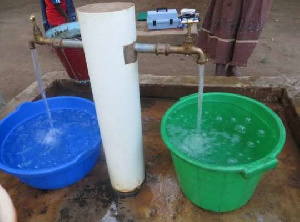General News of Thursday, 22 April 2021
Source: www.ghanaweb.live
2021-04-22Inconsistent water supply: GWCL rejects claims of over-billing customers
 Customers continue to call out the GWCL for outrageous bills
Customers continue to call out the GWCL for outrageous bills
Management of the Ghana Water Company Limited (GWCL) insists that it is not overcharging consumers who do not get consistent supply of the utility.
According to the company, its meter and estimate billing systems remain fair to consumers across board.
GWCL said they primarily charge all consumers based on amount of water consumed or under special arrangements with
Read full articlethe company.
GhanaWeb monitored coments by GWCL's Head of Communication, Stanley Martey, when he appeared on Citi FM's morning show on Wednesday insisting that despite concerns being raised: “nobody can assume that GWCL is unnecessarily billing him or her”.
“We bill our customers based on their consumption that runs through their meters. If water doesn’t flow through your meter, you wouldn’t be billed, or you will receive your bill but with no consumption.
"If you have water flowing for four days, we will read your consumption for four days and that will be what you will be billed for”, he stressed.
“We also bill based on estimates. We are trying to move from that into the meter all-round customers. But if you are billed on estimates, whether the water flows or not, you will be billed with that estimate.”
“There are days you use more than your estimate, but you don’t complain. If you are not comfortable with the estimate, write to the GWCL to be given a meter, so you will be billed based on consumption,” he added.
A number of customers have in recent times turned to the media to call out the utility provider for charging bills that are not comensurate with the supply they give.
A Citi report said residents of Abokobi-Purewater in the Ga East Municipality of the Greater Accra Region have, for instance, pooled resources to pay for water to be supplied to their area for about two years without success.
On the issue of achieving broader coverage in the area of water supply, Martey said: “In everything we do, we need to plan. There are development plans for the communities.
"That is what we look at before we extend water supply to some areas. We just don’t extend because there are budget implications. Every year we have to make projections and budget for the ensuing year.”
“So, if it is not within our budget, it becomes difficult. Already, we don’t have enough funds, how can we just extend? We have already said there is a gap between demand and supply in Accra. So the more we extend, the more we create problems for ourselves” he added.











